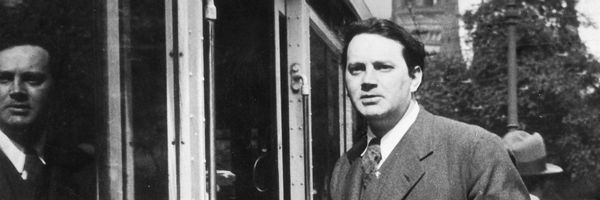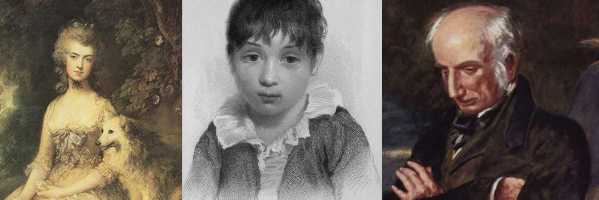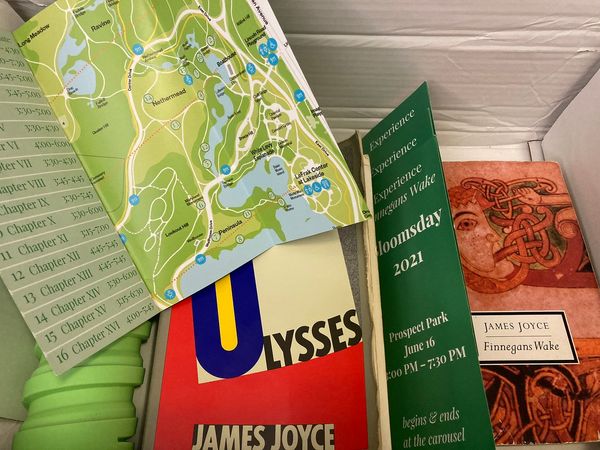The Always Online Prelude

PreCursor Monthly – March 2021
Prophets of Nature, we to them will speak
A lasting inspiration, sanctified
By reason and by truth; what we have loved
Others will love, and we may teach them how:
Instruct them how the mind of man becomes
A thousand times more beautiful than the earth
On which he dwells, above this frame of things
(Which, 'mid all revolutions in the hopes
And fears of men, doth still remain unchanged)
In beauty exalted, as it is itself
Of substance and of fabric more divine.
— William Wordsworth, The Prelude
Today in unacknowledged legislation, we are going to be talking about something no one is talking about and the noisy substance of which it is made.
February 2021 saw two big releases of hyperconnected novels: Lauren Oyler's Fake Accounts and Patricia Lockwood's No One Is Talking About This. Both are about very online people. I would define "very online" as "Heavy digital media consumption, with a significant part of one's understanding of the world being framed by online conversations."
"Always online" is a broader concept, which I would define as "Existing under conditions by which one is always potentially reachable, and the information never stops flowing." Even those among us who are not very online tend to be effectively always online.
Consensus Narration
Being always online poses some dramatic restraints on a narrative. Fake Accounts grapples with this in being structured around a very online narrator completely missing key information about her boyfriend. It is the kind of information the networks are supposed to make visible, but even as we see her online for hours and hours, some information slips by. It never comes to her attention. This is part algorithmic and part social.
One way to drive dramatic interest with a very online subject is to modulate the rate of activity. Focusing on offline activity enables normal use of standard narrative models, and the more deeply online a character is, the more dramatic the shift when that bubble starts to be pressed on in various ways. Fake Accounts is very much about such pressure being applied antagonistically.
The novel also differs stylistically from No One Is Talking About This in just how much the focus is on the offline. Oyler's narrator is constantly on her phone, and our attention is drawn to the fact that some details of a walking route have been blocked out from the narrative because the narrator was too distracted staring at her phone, but we pretty much never see what the content of her phone is like.
Notably, the incident which kicks off Fake Accounts is the narrator peeking into her sleeping boyfriend's phone, digging into a folder, and finding a secret Instagram account posting right-wing conspiracy theories with seemingly ironic typos. We never see quite the same from her. She occasionally explains stylistic quirks, such as how she reads her own punctuation use or how she imagines her profile picture represents her. What the social feeds with which she spends so much of the novel look like, however, is unknown.
We can guess, because the novel starts, "Consensus was..." then goes off on a list of things which would be consensus in the narrator's liberal Brooklyn media circle in late 2016 / early 2017. She herself doesn't particularly want to go the Women's March, but feels enough social pressure that she does. Perhaps the gist we can get from that is enough. What is of interest is her realization that, just as she can craft an online persona, she can also play any role she wants in meeting strangers for casual dates.
The novel relies on offline experience to drive its narrative, with the point being how poorly being very online situates the narrator for those experiences. She thinks she is a master of crafting the self, but is deeply open to parody. This is true within the story, and in the writing's self-aware, semi-autobiographic meta layer. I quoted one line ("The mattress was as thick as a copy of Infinite Jest.") and the bipartisan desire to dunk on it made it my most successful tweet ten times over. I take the tweet's success as proof of Oyler's understanding of the platform and people's attitudes toward certain forms of irony.
Ultimately, though, Fake Accounts devotes significant attention to the construction of the novel itself. The most heavy-handed instance of this is a 40-page section parodying a fragmented style of narrative which Oyler herself openly dislikes. The narrator is explicitly bad at this style and it is meant to be a failure of an experiment which the narrator then drops. As self-aware as Oyler is in writing the novel, she leaves her narrator critically lacking in self-awareness, a content-producing machine among content-producing machines who is herself deserving of mockery.
What No One Is Talking About
Lockwood's novel is in that fragmented style: a long series of one to three short paragraphs, just a little anecdote before moving on to another anecdote. Oyler's narrator comments that reality does not really work like that, though Lockwood's narration does not try to follow the logic of her narrator's life so much as the endless procession of passing viral jokes.
As invested as No One Is Talking About This is in memes, it allows much more space for the possibility of an individual, creatively acting character. Where Fake Accounts opened with the Gibsonian "consensus-hallucination" that is cyberspace, Lockwood opens with the Wordsworthian "She opened the portal, and the mind met her more than halfway." In "Tintern Abbey," Wordsworth writes that he is still a lover "of all the mighty world / Of eye, and ear,—both what they half create, / And what perceive." This imaginative power – not completely forming the world, but combined with and equal to perception – also expands into memory in his epic poem, The Prelude, such that, looking back, "I seem / Two consciousnesses—conscious of myself, / And of some other being." In Fake Accounts, this other being is what the title suggests and adds up to almost nothing, a pathetic part of a mass trying to be made legible through small typos and quirks in punctuation. In No One Is Talking About This, the portal is everywhere and everyone, but we do half-create our experience.
That we can create poses a different sort of crisis. The central tension of the novel is her sister's pregnancy and eventually born baby. This starts out frivolous: The narrator, the older sister, has not had a baby. She is mildly famous for a different sort of creation: A post that said, "Can a dog be twins?" She has become a bit of an expert on new forms of popular media, about which she speaks at length. That her sister is having a baby is a point of difference between them, but not made to be a big deal. She is happy for her sister, though it is somewhat a matter of course – until it isn't.
The baby starts to develop a rare disorder and seems to have little-to-no chance for long-term survival. This shifts the narrator's sense of time outside of that of the viral moment to that of the precious time allotted to this child. In this rapid shift of attention comes another pressing question: Understanding now just how precious and fragile children are, what exactly are we leaving them?
As a practicing expert in memes, the narrator's attention stays mainly focused on that arena throughout the book. Accordingly, much of the novel is a record of the deeply trivial, such as how the culture has shifted away from cat names such as Mittens or Pussywillow to Dr. Butthole, a name vulgar and mock-professional.
Like with Oyler's novel, there is some direct consideration within the novel of how one can write about this world. It is suggested it would take someone of the caliber of Jane Austen to write a social novel of this era, though the expectations of what is there to be captured remain low:
how will we preserve it for the future—how it felt, to be a man around the turn of the century posting increasing amounts of his balls online?
Though one can locate elements of the vulgar within classics, there is also a necessary level of elevation. Austen took her world and crafted it into what we now assume to be the inherent, natural form of the novel. The narrator says to one of her peers, "They're getting it all wrong, aren't they? Already when people are writing about it, they're getting it all wrong." There are two anxieties in the novel: The first is this sense that this world in which she lives is being lost to time, then comes the question of, well, what is some future person with precious little time supposed to make of any of this? What is the value to those who are not in on the jokes already?
The catalog structure of the novel is part of a compulsion, an original sin going all the way back to Adam and Eve. In explaining how rare the baby's condition was, Lockwood has her narrator compare the situation to "the tree of knowledge" producing an orange suddenly in place of its usual apples. In the next line, she writes:
"Still," the doctors urged them finally, "don't go home and look this up." That was the difference between the old generations and the new, though. She would rather die than not look something up. She would actually rather die.
That the eating of the tree of knowledge is what introduced death into the world – or that Orpheus as well could not help but look back, though warned – seems lost on the narrator herself, who a paragraph up had just imagined the geneticist trying to explain who Proteus was to her so she could say indignantly, "Who do you think you're talking to? I was a mythology girl." Lockwood thus puts in this disconnect: The old generations would always also rather die than not look something up.
The experience of loss allows her to at least temporarily free herself of this sinful impulse, to feel truly free of her phone, no matter what valuable information may be stored away on there. Like with Fake Accounts, though, we as readers must also bear this weight of sin through reading.
Also, like Wordsworth tracing back his formative moments in The Prelude so that he can write his real grand philosophic poem, both Fake Accounts and No One Is Talking About This are mapping out the limits of their very online characters. Perhaps Oyler and Lockwood will do better than Wordsworth in crafting their full accounts of man, nature, and society – updated for the 21st century digital world – in their lifetimes.
The Flarfy Poetics of Search Engines
As these sorts of Internet novels come up occasionally, one way of promoting them is to emphasize the distinct efforts of the work. Alongside the release of his novel Book of Numbers in 2015, Joshua Cohen did an interview with The New Republic in which he said, "the Internet has taken so much from writing—it’s time that writing took something back from the Internet." I was reminded of this quote as Lockwood took freely from the Internet in writing No One Is Talking About This.
This act was not new to Cohen, though, and what I was most reminded of at times was Flarf, a poetry movement and method of mining the Internet through pushing the limits of its search engines to find oddities, vulgarities, and thoroughly junk data. The curation and earnest presentation of online media – from the mega-viral to the more niche favorites of certain classes of the very online – struck me as "Flarf, but unironically." The form goes back to around 2001, but let's bring that a bit closer to the present with Pascalle Burton's 2010 "Flarfing Ginsberg."
Burton is arranging and crafting what search results tell her about Allen Ginsberg, the 20th century Beat poet. We have categories of results in line two ("Academic articles, collected poems") and generic templates in line fifteen ("Join Facebook to start connecting with Allen Ginsberg"). Through her structuring, Burton is able to bring in some of the less expected results with the expected. In line six, we see Ginsberg's famous "obscenity trial," but preceded by the words "Zombie Hamster." What do those words have to do with Ginsberg or each other, or obscenity trials more broadly? The poem does not tell us this, but it does tell us the association appears somewhere amid a search engine's attempt to deliver relevant information on Allen Ginsberg. We see the logic of such association more two lines down:
Forthrightly gay, freedom fighter, free collection, free download, listen free
The first two are standard descriptions of Ginsberg, but then the "free" in "freedom" spins off into suggestions of much more popular searches.
In the end, we end up with a direct quote from Ginsberg, from a 1990 interview: "That's not an accurate quotation." Looking back at the context of the interview, there are two levels of wrongness. The interviewer is literally wrong, quoting the line as "best young minds" rather than simply "best minds." He is also over-simplifying Ginsberg's sense of madness in modern society. Where John Lofton pushes the question of madness as purely negative, Ginsberg holds out the possibility of "divine madness," among other kinds.
This inaccuracy is the core design principle of Flarf: our search engines reveal enough relevant information to produce a reasonably coherent poem (this is identifiably about Ginsberg), but they also warp, steamroll, mislead. Flarf poems use and mirror back that wrongness, tackling subjects unfit for poetry in manners unfit for anyone.
It is a craft to make a poem so messed up, and yet our online information systems play this out incessantly.
Internet Detritus Poetry
We now have more tools available to draw from the Internet. While No One Is Talking About This threads a catalog of content together through a personal narrative, something like Flarf tries to float closer to the natural language of the Internet, but we are no longer as limited in sourcing content and never truly had to stick to intentional awfulness of style.
In "The Hyperconnected Lyric," I looked at, among other things, a chapbook titled poems for my FBI agent which imagines its speaker's personal, poetic accounts as constantly under the watch of a dedicated FBI agent assigned to monitor the very online poet.
Charlotte Geater has a more recent zine, available for free, title the internet dreams of emily dickinson, which is "rewriting Emily Dickinson with the detritus of the internet." Using a GPT-2 model, the poems use a corpus of Dickinson poems to guide poetic structure and some language, while also incorporating language of things Dickinson could have never encountered. There are some larger implications as the process develops further, but it is fun, and produces results such as this:
Her Web is where I lay my bug ;
Her Phone is where I ring —
To tell her what I am thinking
Or to ask her to the Window —
Or to invite a Crumb —
Conclusion: Growth of a Very Online Writer's Mind
Overall, what I have sought to explore in bringing these works together is:
- We live in a complex state of being always online which presents new challenges for literature which are not yet fully explored.
- That online life includes many distinct cultural markers, and the very online are distinctly capable of accounting for those and bringing them together.
- Merely presenting elements of that world for inspection has limits.
- Literature of limited focus can be good, and perhaps even necessary as a prelude for more expansive, long-term projects.
Wordsworth traced back his formative moments in The Prelude so that he could best understand his imagination in writing The Recluse. Taking stock of how our digital imagination is formed is important, as is that which is formed.
In concluding The Prelude, Wordsworth declares that he will "Instruct them how the mind of man becomes / A thousand times more beautiful than the earth / On which he dwells." In both the recent novels with which I opened, the authors seem to find much beauty in what Lockwood terms "the portal," but both get caught in the weeds of how jarring and unpleasant that space can be. There are valuable perspectives in both, but so much left unseen of the beauty of the mind's interplay with the (digital) world.
In returning to Tintern Abbey, Wordsworth finds "Abundant recompense." How is our imagination formed today, and how might we fund such recompense? We see in these works a prelude to such perspective, and we will continue in this quest next month with another PreCursor Monthly.
[Header image: from John Martin's illustrations of Paradise Lost.]
This post was sent out as my free monthly newsletter, bringing together in conversation new literature, classic literature, and computer-based writing. If you want to continue to receive content like this each month, just sign up below (and confirm in your email):





